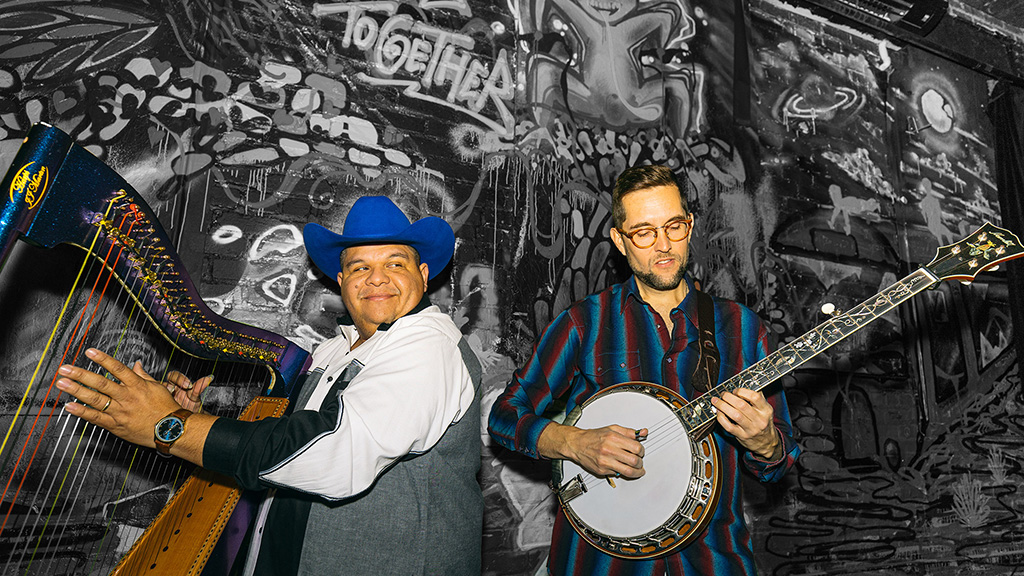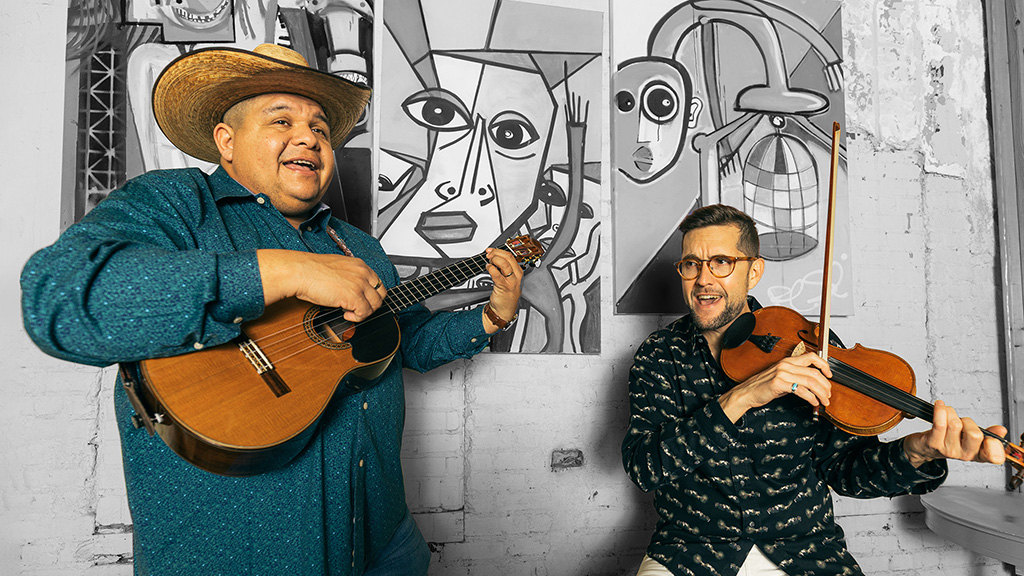While all of us have our individual cultures and backgrounds, and we typically seek out friends and partners with similar ones, sometimes a union of two distinct and diverse cultures can result in something new and beautiful entering the world. This is the case with Larry Bellorín and Joe Troop, whose collaboration forms a melodious bridge between Venezuelan folk and Appalachian folk music. Their duo, resonating under the banner of cultural and musical integration, explores not just the soundscapes of their respective heritages but also narrates a profound story of migration, asylum, and artistic convergence. I spoke with Joe Troop of Larry & Joe ahead of their appearance at Rose Bowl Tavern on Thursday, May 9th.
Larry Bellorín, an asylum-seeking Venezuelan folk artist, brings with him the soulful strains of the Llanera—his homeland’s plains music rich in storytelling and poignant harp melodies. Joe Troop, a North Carolinian musician and former leader of the Grammy-nominated ensemble Che Apalache, lends his expertise in Appalachian folk and a deep commitment to social issues affecting migrants. “I met Larry through a mutual friend who knew that I was both a musician and was volunteering with asylum-seeking migrants in 2021,” Joe explained during our interview. He continued, “I did not know that he was an incredible multi-instrumentalist, and just kind of the whole package until I saw videos of him. Then I realized that he was a special musician. He was very talented.”
The partnership between Larry Bellorín and Joe Troop ignited during a live performance at a venue in Durham, North Carolina, where the musical chemistry between them was palpable from the outset. “We just clicked, finishing each other’s musical sentences. It felt like a predestined match,” Joe recalls, reflecting on the profound connection they felt almost instantaneously. This concert wasn’t just another gig; it was a pivotal moment where both musicians felt a deep, almost instinctive synchronization of their artistic expressions.
This serendipitous meeting at the Durham gig was the catalyst for a deeper collaboration. Inspired by the natural harmony they discovered that night, Larry and Joe committed to blending the rich traditions of Venezuelan music with the string-driven sounds of Appalachian tunes. This blend went on to form a new musical sound— a sound that resonates with the echoes of the past while speaking boldly to the future. It was a creation that promised to expand the boundaries of folk music, offering audiences a unique auditory experience that celebrated both the diversity and the similarity of human experiences across continents.
Their project isn’t just about mixing music; it’s about crafting a narrative that respects their origins while forging a new path. Joe reflects on their unique collaboration, saying, “It’s a bit different because it’s kind of like there’s no band leader. We’re both bringing stuff to the table and we’re working as a duo. It’s not really no one not neither one of us is leading it.” This creative process has led to a blend that respects tradition while innovatively transcending it, integrating elements of both Venezuelan and Appalachian music into a new, eclectic sound. Joe’s deep engagement with Venezuelan music, enriched by his previous experience with Latin American musical styles, adds a further layer of authenticity and exploration to their partnership.
Joe Troop’s collaboration with Larry Bellorín has profoundly influenced his instrumental technique, particularly on the banjo. Reflecting on the adjustments he’s made, Joe explains, “I have adapted a lot of techniques that have never been done to my knowledge on the banjo.” These adaptations include “right hand strumming techniques with the fingers that with my pinky and ring that don’t have picks on them to emulate, to imitate the Quatro,” and “thumb lead picking patterns to imitate the mandola Venezuelan to guitar like instrument.” Joe’s approach to integrating these new techniques is both innovative and respectful, deeply enriching his musical expression and understanding of different cultural sounds.

Joe shared a particularly poignant story from their tours, illustrating the impact of their music: “There was this concert where a little boy with cerebral palsy was brought onto the dance floor by his teacher during our set. “Seeing him engage with the music, completely immersed and joyful — it was just this beautiful moment of participation and normalcy in that child’s life that he was just with all the other children. It was a completely normalized thing and we saw it from stage and it was beautiful. Our hearts melted for that beautiful educator, that man who spends his whole life working with special needs children. That was a very touching moment for both of us.”
Beyond the music, Larry and Joe share common ground in their life experiences and values. From their love for food — Larry’s newfound penchant for Thai cuisine thanks to Joe’s influence — to their appreciation for nature and rural crafts, their partnership is rooted in mutual respect and shared passions. “We both see music as a form of spiritual medicine, a way to bring joy and a sense of community to our audiences,” Joe reflects.
Their collaboration also serves as a voice for those less heard. Joe’s advocacy through music, especially regarding migrant rights and the challenges faced by asylum seekers like Larry, is a cornerstone of their performances. “I’m playing with an asylum-seeking migrant who, up until this duo, was working in construction, which doesn’t make any sense because his true vocation is music. He’s very, very good at it,” Joe explains, highlighting the societal challenges faced by migrants like Larry.
As they continue to tour and share their unique blend of Venezuelan and Appalachian folk, Larry and Joe are not only showcasing their cultures but also creating a new legacy of folk music that bridges divides. Their journey is a testament to the power of collaboration across borders and the beautiful music that can arise when diverse worlds harmonically converge.
Larry & Joe
Rose Bowl Tavern
106 N Race St
Urbana
Th May 9th, 8 p.m.
$15 to $20








